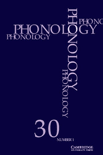
Phonology
Scope & Guideline
Advancing the Science of Sound
Introduction
Aims and Scopes
- Theoretical Phonology:
Exploration of frameworks and models that explain phonological phenomena, including Optimality Theory, Harmonic Serialism, and various approaches to morphological tone. - Phonological Acquisition and Learning:
Research on how phonological systems are acquired, including studies on biases in learning and the role of implicit vs. explicit processes in understanding phonological concepts. - Tone and Stress Systems:
Investigation into the role of tone and stress in various languages, including grammatical tone, stress patterns, and their implications for phonological theory. - Phonetics-Phonology Interface:
Studies examining the interaction between phonetics and phonology, including acoustic properties and articulatory coordination. - Cross-Linguistic Studies:
Analysis of phonological phenomena across different languages, contributing to a broader understanding of universal phonological principles.
Trending and Emerging
- Emergent Phonology:
A focus on how phonological systems can emerge and develop, often through novel frameworks that challenge traditional views. This theme is increasingly relevant as researchers seek to understand phonological processes in real-time language use. - Learning and Cognition in Phonology:
Research on implicit and explicit learning processes in phonological concept acquisition is on the rise, emphasizing the cognitive aspects of phonology and how learners interact with phonological rules. - Integration of Phonology and Other Domains:
There is a noticeable trend towards examining the intersections of phonology with other linguistic domains, such as syntax and morphology, suggesting a more holistic approach to understanding language structure. - Experimental and Cross-Disciplinary Approaches:
An increase in studies employing experimental methods and cross-disciplinary perspectives, including phonetic analysis and computational modeling, indicates a shift towards more empirical research methodologies. - Focus on Tone Systems:
Research on grammatical tone and its implications for phonological theory has seen a marked increase, highlighting the significance of tone in understanding phonological structures across languages.
Declining or Waning
- Historical Phonology:
Research focusing on the diachronic aspects of phonology, such as sound change and historical linguistics, seems to be less prominent in recent issues, possibly as the field shifts towards more empirical and experimental approaches. - Phonological Theories with Limited Applicability:
Certain phonological theories that have not gained traction or have been deemed less applicable in current research contexts are appearing less frequently, indicating a shift towards more universally accepted frameworks. - Morphosyntactic Interfaces:
While still relevant, studies specifically examining the interfaces between phonology and morphosyntax seem to be declining in frequency, as more researchers gravitate towards direct phonological inquiries.
Similar Journals
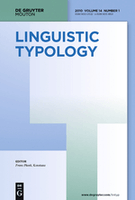
Linguistic Typology
Exploring the Diversity of Language StructuresLinguistic Typology is a premier journal focused on the comparative study of language structures and the classification of languages, published by Walter de Gruyter GmbH in Germany. Since its inception in 1997, the journal has established itself as a leading platform in the field of linguistics, achieving a remarkable Q1 category ranking in both Linguistics and Language for 2023, reflecting its impact and relevance among scholars. With a notable position in the academic community, evidenced by its 91st percentile rank in Arts and Humanities and 90th percentile in Social Sciences according to Scopus, Linguistic Typology invites contributions that explore the rich diversity of language structures, promoting a deeper understanding of linguistic phenomena across various cultures. While currently not offering open access, the journal remains a pivotal resource for researchers, professionals, and students aiming to advance their knowledge in the dynamic field of linguistics. For more information, deliverables, and submission guidelines, please visit the journal's official page.

Language and Linguistics
Pioneering Research in Language and LinguisticsLanguage and Linguistics is a leading academic journal published by ACAD SINICA, INST LINGUISTICS, based in Taiwan. Established in 2008, this journal has rapidly gained recognition within the field of linguistics, achieving a commendable ranking of Q2 in the 2023 category quartiles and holding positions in the top percentiles of Scopus rankings for both Arts and Humanities and Social Sciences. With an ISSN of 1606-822X and an E-ISSN of 2309-5067, the journal aims to foster the development of linguistics research by providing a platform for the dissemination of innovative and interdisciplinary studies. While it currently operates on a traditional subscription model, its significant contribution to the advancement of linguistic theory and its applications makes it an invaluable resource for researchers, professionals, and students alike. Spanning converged years from 2008 to 2024, Language and Linguistics continues to shape the dialogue in understanding language phenomena and encourages submissions that push the boundaries of current linguistic knowledge.

Stellenbosch Papers in Linguistics Plus-SPiL Plus
Fostering Global Dialogue in LinguisticsStellenbosch Papers in Linguistics Plus (SPiL Plus), published by the Department of General Linguistics at the University of Stellenbosch, is a prominent open-access journal dedicated to the dissemination of research in the field of linguistics. Established in 1980, SPiL Plus provides a collaborative platform for researchers, professionals, and students worldwide, facilitating the sharing of innovative linguistics research from diverse subfields. With an ISSN of 1726-541X and an E-ISSN of 2224-3380, this journal has secured its place in the academic landscape, despite currently holding a Q4 ranking in Linguistics and Language for 2023. It's ranked 481 out of 1088 in the Scopus metrics for Arts and Humanities and stands at the 55th percentile, confirming its relevance and contribution to the linguistics discourse. The journal aims to foster scholarly exchange and address significant linguistic issues, making it an essential resource for anyone passionate about language and its complexities. Readers can access its articles freely, promoting wider accessibility and engagement with linguistic research from South Africa and beyond.
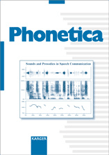
PHONETICA
Elevating Phonetic Scholarship to New HeightsPHONETICA, published by De Gruyter Mouton, is a premier journal specializing in the interdisciplinary study of phonetics, phonology, and their applications in linguistics and acoustic sciences. With an impressive scope covering critical aspects of acoustics and language, PHONETICA has established itself as a leading platform for innovative research since its inception in 1957, continuing through to 2024. The journal boasts a significant impact, reflected in its esteemed Q1 ranking in both Acoustics and Ultrasonics and Linguistics and Language categories as of 2023, positioning it in the top quartile of scholarly journals in its field. PHONETICA's rigorous publication standards attract a diverse array of researchers and professionals, eager to disseminate their findings in an engaging and scholarly environment. Although not open access, the journal remains a vital resource for those seeking to deepen their understanding and contribute to the evolving dialogue in phonetic research.

Language and Cognition
Unlocking the Secrets of Language ProcessingLanguage and Cognition is a premier peer-reviewed journal published by Cambridge University Press, dedicated to advancing the fields of language, linguistics, and cognitive psychology. With an ISSN of 1866-9808 and E-ISSN of 1866-9859, it has rapidly established itself as a pivotal resource for researchers, educators, and practitioners alike. Recognized for its rigorous scholarship, the journal holds a Q1 ranking in Linguistics and Language and a Q2 ranking in Experimental and Cognitive Psychology for 2023, reflecting its esteemed positioning within the academic community. Since transitioning to open access in 2023, it has broadened its reach, making cutting-edge research accessible to a global audience. The journal's emphasis on interdisciplinary studies ensures a comprehensive exploration of the interactions between language and cognitive processes, fostering deeper insights and fostering collaboration across domains. Researchers and professionals looking to stay at the forefront of advancements in these vital areas will find Language and Cognition an invaluable platform for disseminating their findings and engaging with contemporary debates.

NATURAL LANGUAGE & LINGUISTIC THEORY
Illuminating Theoretical Insights in LinguisticsNATURAL LANGUAGE & LINGUISTIC THEORY, published by Springer, stands as a premier journal in the field of linguistics, characterized by its rigorous examination of theoretical frameworks and current research trends within natural language. With the ISSN 0167-806X and E-ISSN 1573-0859, this journal has maintained a stellar reputation since its inception in 1983, consistently ranked in the Q1 category for Linguistics and Language as of 2023. Its impressive standing in Scopus ranks (#127 in Arts and Humanities and #143 in Social Sciences) further underscores its influence, occupying the 88th and 87th percentiles respectively. Although the journal does not provide Open Access options, it remains a vital resource for scholars and practitioners seeking to deepen their understanding of the nuances of linguistic theory. The journal's scope encompasses a wide array of topics relevant to both theoretical analysis and practical applications in linguistics, making it essential reading for anyone engaged in the study of language sciences.
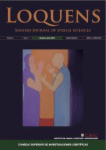
Loquens
Fostering Open Access to Communication ResearchLoquens is a leading academic journal dedicated to advancing the fields of Communication, Linguistics and Language, and Speech and Hearing. Published by the Consejo Superior Investigaciones Cientificas-CSIC in Spain, this journal has established a significant presence in the academic community since its inception in 2018, now spanning several impactful years of scholarly contribution. With its Q3 ranking in Communication and Q2 in Linguistics and Language as of 2023, Loquens serves as a vital platform for researchers and professionals to disseminate their findings and engage in critical discourse. The journal emphasizes the importance of open access to knowledge and provides readers with the opportunity to access its articles freely, fostering a collaborative environment for innovation and exploration in communication and language studies. Despite currently holding modest rankings in Scopus, with a percentile of 15th in Communication, Loquens continually strives to enhance its impact and visibility within the relevant disciplines. This commitment to scholarly excellence makes Loquens an essential resource for those passionate about exploring the complexities of human communication.
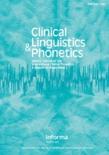
CLINICAL LINGUISTICS & PHONETICS
Pioneering Studies for Better Communication OutcomesClinical Linguistics & Phonetics, published by Taylor & Francis Inc, is a leading peer-reviewed journal that occupies a pivotal role in advancing the fields of linguistics and speech-language pathology. With its ISSN 0269-9206 and E-ISSN 1464-5076, this journal has been instrumental since its inception in 1987, providing an esteemed platform for research that addresses the intersection of language and health. Holding a prestigious Q1 ranking in Linguistics and Language and a solid Q2 rank in Speech and Hearing as of 2023, it is well-regarded for its rigorous standards and impactful research contributions. The journal does not currently offer open access options, yet it remains accessible to a broad academic audience that values quality scholarship. By disseminating vital empirical studies and theoretical advancements, Clinical Linguistics & Phonetics not only enriches the academic discourse but also supports professionals seeking to enhance their practice based on the latest evidence in communication disorders and phonetic research.

Languages
Advancing linguistic frontiers through open dialogue.Languages, published by MDPI, is a prestigious open-access journal dedicated to the field of Linguistics and Language studies. Since its inception in 2016, this journal has rapidly established itself as a leading platform for high-quality research, achieving an impressive Q1 ranking in 2023 and standing out in both the Arts and Humanities as well as the Social Sciences categories with significant percentile rankings (76th and 74th respectively). Based in Switzerland, Languages fosters an international community of scholars who are committed to exploring the multifaceted dimensions of language, from theoretical frameworks to practical applications. With a robust e-ISSN of 2226-471X, the journal prioritizes accessibility, allowing researchers, professionals, and students to freely engage with cutting-edge research and insights. By bridging the gap between theory and practice, Languages plays a crucial role in advancing our understanding of linguistic phenomena, making it an invaluable resource for anyone invested in the study of language.

Language Dynamics and Change
Decoding the Patterns of Language DevelopmentLanguage Dynamics and Change is a premier academic journal dedicated to exploring the evolution, variation, and transformation of languages over time. Published by BRILL, a reputable name in scholarly publishing, this journal aims to provide researchers, professionals, and students with a robust platform for disseminating cutting-edge findings in the field of linguistics. With an impressive Q1 quartile ranking in the Linguistics and Language category and a commendable ranking of #170 out of 1088 in the Arts and Humanities sector, it occupies a significant position in the academic landscape, showcasing innovative research that fosters a deeper understanding of language dynamics. Although it does not currently offer open access, the journal is committed to enhancing accessibility through various distribution channels. As we look ahead to its convergence period extending until 2024, Language Dynamics and Change continues to affirm its status as a vital resource for advancing the study of language evolution worldwide.